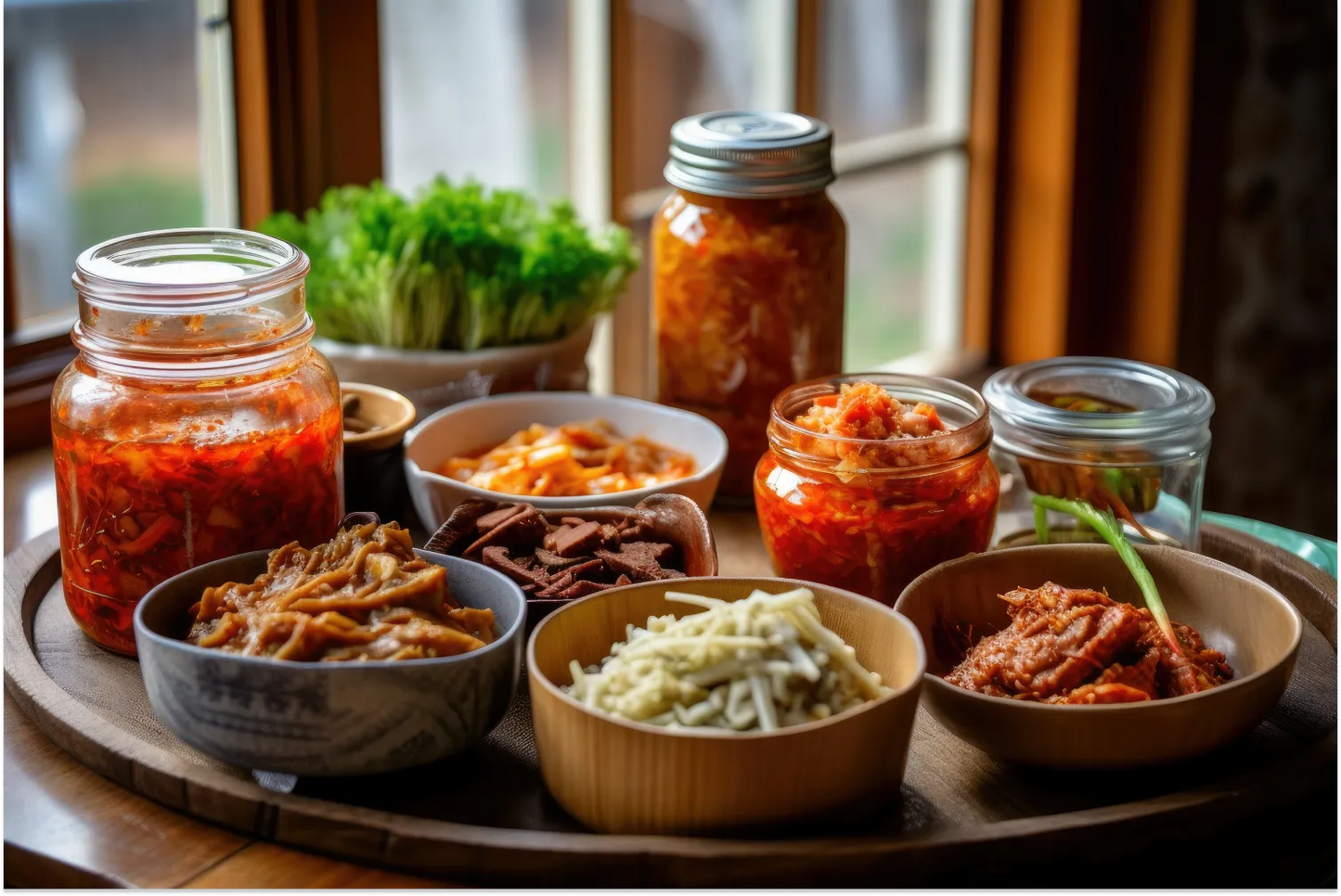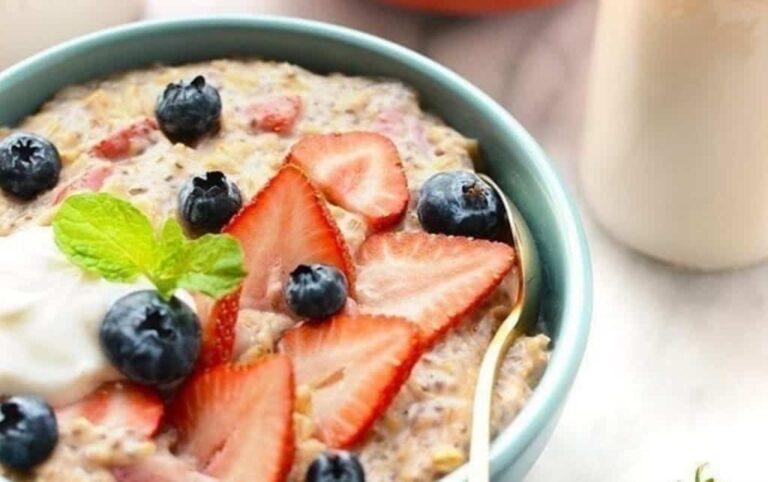
The stomach is located in the center of our bodies, which is convenient because it’s also the center of our health. Despite being often taken for granted, having a healthy gut that’s functioning properly is important for our overall health.
While there are certainly many options out there to help us improve our gut health, one of the most effective ways to support our gut is to eat more probiotics. Join us as we dive deep into probiotics and provide you with a list of foods that should be at the top of your next grocery list.
What Are Probiotics and Why Do They Matter?
Probiotics are, by definition, live bacteria and yeasts that reside in your stomach. These living organisms are essentially the regular “citizens” living in the “city” of your gut and working hard to keep it clean and operational.
It may sound bizarre to see the word “bacteria” and not immediately think of infections and illnesses. While there are certainly some bad bacteria living in your intestines, there are trillions more of them that are close allies in our quest for optimal health.
Here are just a few of the remarkable benefits of probiotics:
- Supports the immune system
- Helps with digestion
- Helps with nutrient absorption
- Encourages weight loss
- Supports healthy levels of cholesterol
- Helps support a healthy blood pressure
The Connection Between Gut Health and Overall Health
Often dubbed the body’s “second brain,” our gut extends its influence beyond mere digestion. Not only is it deeply intertwined with our immune function, but an imbalance in the gut can cascade to other systems, resulting in everything from mood swings and fatigue to bloating and more intense digestive issues. Essentially, nurturing our gut health translates to a holistic wellness approach, benefiting both mind and body.
Advantages of Probiotic Foods Over Supplements
While probiotic supplements have gained popularity, offering a convenient avenue to bolster gut health, real food sources slightly edge them out.
Here are a few reasons why:
- Probiotic foods often feature other essential nutrients, making them a more holistic nutrition choice.
- Our bodies have evolved to extract nutrients from food sources, so deriving probiotics from food instead of supplements can ensure proper absorption and utilization.
- Supplements, although powerful, might not always provide a diverse range of bacteria strains. Diverse sources offer a richer microbial palette, which is essential for a balanced gut.
With that being said, there’s no downside to using supplements to further support your gut. In addition to eating more probiotic-rich foods, incorporating Dr. Kellyann’s BellaBiotics supplements into your daily routine can ensure you’re getting enough probiotics every day.
Prebiotics vs. Probiotics
Despite sounding very similar, prebiotics and probiotics serve very distinct roles within your body. Prebiotics are essentially food for our new favorite bacteria. These non-digestible food ingredients act as fuel for probiotics, ensuring their growth and activity.
By consuming prebiotics, probiotics can thrive, multiply, and perform their functions more efficiently. So, if you’re planning to increase your probiotic intake, then you might want to add some prebiotic foods to your grocery list, too.
These can include:
- Garlic
- Onions
- Leeks
- Asparagus
- Barley
- Bananas
- Oats
- Apples
- Cocoa
- Flaxseeds
Top 12 Probiotic-Rich Foods
The journey to digestive health can feel like an impossible task sometimes. However, enlisting probiotics as your trusty companion can make the journey much easier. Here is a list of the 12 best probiotic foods that can help you achieve a healthy gut microbiota:
1. Sauerkraut
Fermented cabbage might seem like a simple side dish, but sauerkraut is nothing short of a wonder for our digestive health. Its tangy crunch is not just pleasing to our taste buds — it’s also a robust source of Lactobacillus bacteria. These beneficial microorganisms are instrumental in fostering a gut environment that’s both balanced and thriving.
2. Kefir
Journey to Europe, and you’ll find kefir gracing breakfast tables and evening snacks alike. This fermented milk drink doesn’t just offer a delightful tang but is also an elixir of beneficial bacteria, active cultures, and kefir grains. It’s a calcium-rich potion, fortifying bones while supporting digestive health.
3. Buttermilk
Buttermilk, with its distinctive tartness, is not just a recipe ingredient but a gateway to better gut health. Traditional buttermilk is a proud host to Lactobacillus acidophilus and several other probiotic bacteria. Consuming it is like inviting an army of allies to support our body’s digestive processes.
4. Miso
Miso soup might be a warm, comforting bowl of joy, but it’s also a potent source of probiotic goodness. A cornerstone of Japanese culinary practices, miso is created from fermented soybeans, encapsulating the essence of fermentation and delivering benefits directly to our gut.
5. Kombucha
While kombucha has recently taken the world by storm, its roots trace back to ancient practices. This fizzy fermented tea is more than just a refreshing beverage. It’s a celebration of live cultures that play a pivotal role in fortifying our gut and supporting our body’s natural defenses.
6. Tempeh
Venture to Indonesia, where tempeh is a familiar and beloved food source. Made from fermented soybeans, tempeh is a versatile ingredient, perfect for blending into smoothies or featuring as a protein-rich side dish. Not only does it cater to our protein needs, but it’s also one of the best probiotic foods, promoting balance and vitality in our gut.
7. Natto
If you take a peek into a Japanese kitchen during breakfast, you’re likely to encounter natto. These sticky, fermented soybeans might be an acquired taste for some, but their health benefits are universally acknowledged. Natto is a prime source of bacillus subtilis, a strain of beneficial bacteria that champions our digestive health and overall well-being.
8. Sourdough Bread
Who doesn’t love the rustic charm of a sourdough loaf? This bread isn’t just a gourmet’s delight but also a favorite of those who are mindful of their gut health. The fermentation process employed in making sourdough involves lactic acid bacteria that diligently break down gluten. As a result, it’s a gentler companion for our gut compared to many other breads, marrying taste with wellness.
9. Yogurt
When one thinks of probiotics, yogurt often comes to mind, and for a good reason. Especially when we talk about Greek yogurt, which is thick, creamy, and tangy. This dairy marvel is teeming with friendly bacteria strains like Lactobacillus and Bifidobacterium. Consuming it regularly means showering our gut with microbial allies, each spoonful promoting balance and vitality.
10. Cottage Cheese
Imagine a cozy morning where you indulge in creamy cottage cheese sprinkled with chia seeds or topped with vibrant, fresh fruits. While such a delight satisfies our palate, it’s also a strong worker for our digestive system. Cottage cheese is full of active cultures, making it not just a dairy delight but also a commendable ally for a healthier gut.
11. Apple Cider Vinegar
Beyond being a zesty addition to our salads, apple cider vinegar is a testament to the wonders of fermentation. This tangy liquid, often heralded for its own multitude of health benefits, is also an advocate for gut health. Its unique composition supports a balanced gut environment, fostering a community of beneficial bacteria that champions our digestive wellness.
12. Kimchi
Journey to the vibrant culinary landscape of Korea, and you’ll meet kimchi — a dish that’s both flavorful and fierce. This spicy fermented cabbage doesn’t just add zing to your meals but also invigorates your gut microbiome. Packed with beneficial bacteria and rich in nutrients, kimchi is a celebration of Korean heritage and a gift to our digestive health.
What Should You Consider When Eating Probiotic Foods?
Before diving headfirst into the world of probiotics, there are a few more things worth mentioning that can help you maximize the benefits.
One of the most important considerations is to ensure that you’re consuming genuine probiotics. It’s a good habit to always inspect labels and check for “live and active cultures,” as this indicates the presence of functioning and beneficial bacteria.
Another thing to check on the label is the added sugar content. It’s very common for certain foods, especially dairy products, to be flooded with extra sugars to make them taste more desirable. Beware of these options, as too much added sugar can counteract the benefits of probiotics and contribute to health issues over time.
The last thing to keep in mind is that all of our bodies are unique. A superfood to one person might trigger the allergies of someone else and result in gastrointestinal distress. While some of the dairy products listed above are incredible sources of probiotics, it’s generally best to leave them alone if you’re lactose intolerant.
Always be mindful of your body’s responses, and if you’re unsure, then it’s best to seek out medical advice from a healthcare professional, nutritionist, or dietitian. They can ensure that you’re getting all of the good bacteria that you need without all of the bad side effects.
How Else Can You Support a Healthier Gut?
The quest for a thriving and resilient gut extends far beyond eating more probiotics and fermented foods. While the foods mentioned above can absolutely help, one of the best ways to achieve optimal results is by taking a holistic approach to your gut health.
Here are a few changes that you can make in your daily routine that can not only support your gut health but your overall health, as well.
Stay Hydrated
You already know how important water is to survival. Even though staying properly hydrated is essential, it can be a bit difficult since plain water is just so boring.
If you’re struggling to stay hydrated, then consider trying out our flavored Lemon Sips powders. Infused with zest and vital nutrients, every gulp not only rehydrates but also adds a dose of nourishment, making it a dual-purpose delight for our bodies.
Eat Slowly
Our modern lifestyle, with its hustle and bustle, often disconnects us from the act of eating. It’s essential to resurrect the lost art of mindful eating. By savoring each bite and chewing slowly, we aid our digestive system. This simple act enhances nutrient absorption and rekindles our bond with the food we consume.
Limit Artificial Sweeteners
While they might seem like a guilt-free alternative to sugar, artificial sweeteners can be Trojan horses, disturbing the fine balance of our gut microbiome. Opting for natural sweeteners or curbing the overall intake can help in preserving the harmony of our gut flora.
Consume Bone Broth
Bone broth is more than just a savory beverage. Dr. Kellyann’s Bone Broth is a reservoir of essential nutrients. Every spoonful serves as a rejuvenating elixir, supporting not just the gut but the entire body, encouraging holistic well-being.
Reduce Stress
Our mental and emotional well-being casts a direct reflection on our gut health. Persistent stress can disrupt the tranquility of our digestive system. This is why it’s important to incorporate more stress-busting activities like meditation, reading, or any hobby that offers solace into our daily lives.
Get Enough Sleep
Rest is not a luxury but a necessity. Clocking in seven to nine hours of undisturbed sleep is key. It’s during this downtime that our body resets, heals, and rejuvenates. A well-rested body directly translates to a thriving and efficient gut.
Exercise Regularly
Exercise isn’t just for aesthetic appeal or cardiovascular health. It’s also a fiesta for our gut bacteria. Regular workouts promote the survival of beneficial gut microbes, leading to a diverse and balanced gut ecosystem. Whether it’s a brisk walk, yoga, or intensive training, keeping your body in motion positively impacts digestive health.
The Bottom Line
Nurturing our gut goes beyond mere food choices. It’s a holistic journey, weaving together lifestyle habits, mindfulness, and dietary practices.
As you contemplate making these positive shifts, consider integrating the power of probiotics into your routine. Their potential to balance and rejuvenate our internal ecosystem can be a game-changer.
And for those looking for a touch of expert advice, delve deeper into Dr. Kellyann’s resources for gut support. Adding them into your daily routine can give you a strong starting point on your path to digestive well-being.
Sources:
Probiotics: What is it, Benefits, Side Effects, Food & Types | Cleveland Clinic
Probiotic Supplements: Hope or Hype? | PMC
Is Drinking Kefir Healthy for You? | Cleveland Clinic
Buttermilk: Nutrition Facts and Benefits | Live Science
Nutritional Health Perspective of Natto: A Critical Review | PMC
Understanding and Selecting Sourdough for Health Benefits | Colorado State University
Yogurt | The Nutrition Source | Harvard T.H. Chan School of Public Health
Health Benefits of Apple Cider Vinegar | Cleveland Clinic
Mindful Eating | The Nutrition Source | Harvard T.H. Chan School of Public Health
Effects of Sweeteners on the Gut Microbiota: A Review of Experimental Studies and Clinical Trials | PMC




